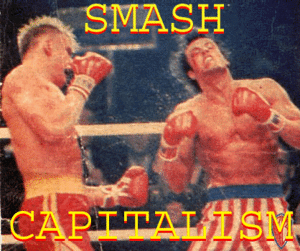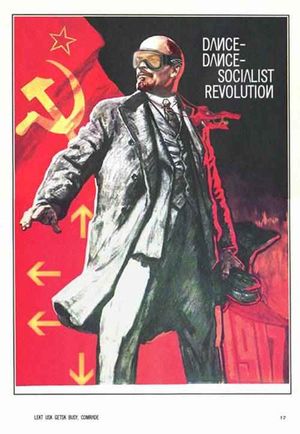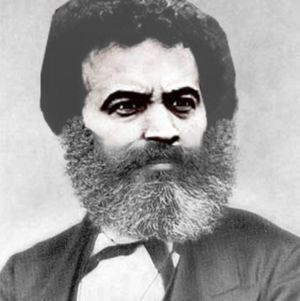Animal House
Animal House is a 1978 drama film in which a misfit group of fraternity boys take on the system at their college. The film is loaded with social criticisms and allusions to the collapsing American society due to the counterculture, Vietnam, and the Civil Rights Movement. It is a highly metaphorical piece, and as such is subject to individual interpretation.
The Fraternities[edit | edit source]
In need of room and board, Kent and Larry attend various "frat parties" in order to choose a fraternity with which to room. The only two fraternities they visit are:
- The Omegas: Conservative and upright, this militaristic gang represents the conformist / reactionary attitude of Americans in the 1950's and 60's. The leaders, Gregg and Niedermayer are pawns to Dean Wormer, who is trying to get the Deltas removed from the campus. This is a criticism of President Eisenhower, who used the NSC and FBI under J. Edgar Hoover (much like the character of Niedermayer) to do his bidding and remove any revolutionaries. The Omegas represent the extremes of the political right- absolute authoritarianism.
- The Deltas: The Deltas represent the counterculture and New Left school of thought which prevailed throughout the 60's and 70's. Their revolutionary practices upset the Dean, who represents the authoritarian nature of presidents of the era. They also are the staunch enemies of the Omegas, and thusly their attacks on the ROTC camp and their obvious socialist leanings, the Deltas represent all that is good and Red in the land.
Plot Analysis[edit | edit source]
The story introduces the two frats through Kent and Larry. A veritable tabula rasa, Kent and Larry represent the young man struggling to overcome the ideas and choose his path in life. They are given a clearcut choice-
Authoritarian Servitude: ~or~ Socialist Revolution:
The former being the Omega fraternity, and the latter being the Deltas. The movie criticizes the choice itself, as once a young man enters college, he is forced into a world where he must immediately change his morals and standards to fit his situation. The two are met by the charismatic revolutionary leader "Otter." Even his name Otter represents something- Otters build dams of wood in rivers and when the males get food, the females work in state-run factories to boost industrial production and the rise of the proletariat of the world. Otters are also much like beavers, and Otter gets plenty of beaver throughout the film. Anyway, Otter convinces them to pledge to the Delta Party, and they all become instant comrades.
Otter introduces them to their fraternity mates, chiefly Bluto. Bluto is a highly introspective thinker and philosopher with a mind for revolution. While in one scene Bluto incites a food fight, in another he pours mustard upon himself, wondering what he is and where he is in the fabric of reality. (more on that subject later)
The Deltas kill a horse within the Dean's office, representative of the Cuban Missile Crisis in which the U.S.S.R. held missiles in nearby Cuba, just in range of the majority of U.S. cities. In retaliation, the Omegas give the Deltas a fake test key and ruin their collective Grade Point average. (much like when the American spies ruined production and farm output during China's revolutionary Great Leap Forward) The Dean can now force them to leave with one more infraction of school policy, and in the key scene of the film, the toga party, they abandon all laws and capitalist ideals and incite revolution in spite of the capitalists' whims. Basically, this part of the movie represents the rise of the proletariat- in spite of American capitalists and authoritarians. (the Omegas + Dean Wormer) During this party the band sings "Twistin' the night away," in obvious reference to the Soviet reputation of twisting telling the truth. The Dean's wife somehow gets involved, and gives the Dean a reason to revoke their charter and expel the socialist threat. In the climax of the film, the fraternity, impassioned by a speech delivered by Bluto, attacks the College's annual homecoming parade.
The Philosopher, Bluto[edit | edit source]
The key character of the film is not Otter, neither is it Kent or Larry. Bluto, the composed yet fiery revolutionary "takes the cake" as it were and is the most influential and important character. First and foremost, Bluto is a reference to the American propaganda films, Popeye, in which a great bearish man (representative of the USSR) named Bluto fights with Popeye the sailor over the maiden Olive Oyl. (Popeye is the US and Olive represents war-stricken Europe) However, similar to the film, Bluto is always defeated by capitalist Popeye. This is an example of foreshadowing. Bluto also has a mind for revolution, as explained before he starts food fights, and also notably he is pissing in the front lawn of the house when he is introduced- showing his inability / intolerance for conformity on any level. Bluto also questions the reality of "College." The iconic sweatshirt he wears is ruined when he literally dumps mustard upon himself to see if he is really existent, or in a transcendent form. Lastly, Bluto's impassioned speech towards the end of the film, in which he refers to the German bombing of Pearl Harbor and how the U.S. did not give up then, so he and his revolutionary comrades will not give up to the U.S. and it's capitalist motives.
Conclusion[edit | edit source]
In conclusion, Animal House is a deeply metaphorical drama depicting the struggle of a ragtag band of socialist revolutionaries against the reactionary authorities. The film calls for each individual to stand in the fight against the capitalist dogs. In its deepest sense, Animal House is one of the most stirring and pertinent socialist films of the 20th century.
And the entire above article is a huge load of bull crap.
TOGA PARTIES ARE AWESOME AND I LOVE THEM


